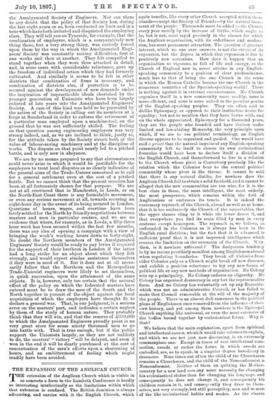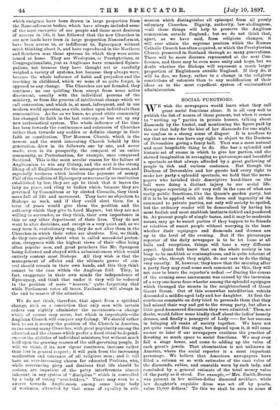THE EXPANSION OF THE ANGLICAN CHURCH.
THE extension of the Anglican Church which is visible in so concrete a form in the Lambeth Conference is hardly so interesting intellectually as the, limitations within which that extension is confined. The British dominion is always advancing, and carries with it the English Church, which again benefits, like every other Church accepted within the islands—except the Society of Friends—by the natural hien-- meat of the people. Thousands must be added to the Church every year merely by the increase of births, which ought to be, but is not, most rapid precisely in the classes for which the Anglican organisation, with its orderliness and modera- tion, has most permanent attraction. The question of greatest interest, which no one ever answers, is not the extent of its expansion, but the degree in which that expansion is due to positively new accessions. How does it happen that an organisation so vigorous, so full of life and energy, as the Church of England now is, never attains in any English- speaking community to a position of clear predominance, much less to that of being the one Church in the sense in which the Roman Catholic became the one Church in the numerous countries of the Spanish-speaking world ? There is nothing against it in external circumstances. No Church organises itself in a new community more readily, none is more efficient, and none is more suited to the peculiar genius of the English-speaking peoples. They are often said to dislike Episcopacy, as opposed to their instinctive desire for equality; but not to mention that they have borne with, and on the whole appreciated, Episcopacy for a thousand years, they are the people who founded and have thriven under limited and law-abiding Monarchy, the very principle upon which, if we are to use political terminology, an English diocese appears to be organised and guided. One would have said a priori that the natural impulse of any English-speaking community left to itself to choose its own ecclesiastical formulas would have been to declare itself a division of the English Church, and thenceforward to live in a relation to the Church whose pivot is Canterbury precisely like the relation which the Colonies bear to the central political community whose pivot is the throne. It cannot be said that there is any natural dislike, for nowhere does the Anglican Church fail to obtain a solid foothold, and it cannot be alleged that the new communities are too wise, for it is the best class in them, the most intelligent, the most orderly, the most prosperous, which remains within the fold of Anglicanism or embraces its tenets. It is indeed the customary reproach of the Church, abroad as well as at home, that it is too exclusively the Church of the respectables, that the upper classes cling to it while the lower desert it, and that everywhere you find its seats filled- by men in every costume except homespun. The reproach is, we believe, as unfounded in the Colonies as it always has been in the English rural districts ; but the fact that it is advanced is sufficient proof that it is not improved intelligence which creates the limitation on the' extensionof the Church. Why, then, is it nowhere universal ? The fissiparous tendency is by no means peculiarly manifest among Englishmen abroad when regulating boundaries. They break off Colonies from older Colonies only as a Church might break off new dioceses, and exhibit a positive reluctance to try any new forms of political life -or any new methods of organisation. No Colony sets up a prineipality. No Colony endures an oligarchy. No Colony has organised democracy in any but the representative form. -And no Colony has voluntarily set up any Executive which was not an administrative Council, or has failed to make that Council removable at the will of the majority of the people. There is an almost dull sameness in the political plans of Englishmen once removed from the influence of their own history, and yet among them nowhere is the Episcopal Church anything like universal, or even the most extensive of the bodies bound together by ecclesiastical forms. Why is that?
We believe that the main explanation, apart from spiritual and intellectual causes, which it would take volumes to explain, and which we are not just now discussing, is an extremely commonplace one. Except in times of vast intellectual com- motion, creeds, or rather the forms in which creeds are embodied, are, so to speak, in a singular degree hereditary in character. Nine times out of ten the child of the Churchman remains a Churchman, and the child of the Nonconformist a Nonconformist. Neither of them on quitting the Mother- country for a new land sees any more necessity for changing his ecclesiastical status than for changing his language, and consequently he does not change it, and consequently his children remain in it, and consequently they draw to them- selves, not very strongly, but still perceptibly, men and women of the like ecclesiastical habits and modes. As the classes which emigrate have been drawn in large proportion from the Nonconformist bodies, which have always included some of the most energetic of our people and those most desirous of success in life, it has followed that the new Churches in our new lands have been in large proportion Nonconformist, have been averse to, or indifferent to, Episcopacy without much thinking about it, and have reproduced in the Northern and Southern seas those systems to which they were accus- tomed at home. They are Wesleyans, or Presbyterians, or Congregationalists, just as Anglicans have remained Episco- palians, not because they have thought out or carefully weighed a variety of systems, but because they always were, because the whole influence of habit and prejudice and the teaching in childhood, which we none of us quite forget, is opposed to any change. The Churches are not founded, they continue ; no one quitting them except from some active discontent, usually with the individual persons of the ministry, or from the process of intellectual change which we call conversion, and which is, at most, infrequent, and in our modern world operates, as a rule, rather upon individuals than communities. As far as we know, no great white community has changed its faith in the last century, or has set up any new ecclesiastical system. The whole influence of the time has been towards the continuance and extension of Churches rather than towards any sudden or definite change in their faith or constitution. Theo Mormon Church, which is the newest and the worst innovating Church beheld by this generation, drew in its followers one by one, and never made, even in its prosperity, the conquest of an entire community, as Protestantism, for example, once conquered Scotland. This is the main secular reason for the failure of Anglicanism to win any Colony, and the next is the strong liking of all Englishmen for the management of business, and especially business which involves the payment of money. Full of the tradition of Episcopacy as necessarily an institution established by law, they are apt to think that it leaves the laity no place, and cling to bodies which, because they are governed by Committees or by elected Councils, they think more full of life and movement. They have no objection to Bishops as such, and if they could elect them for a term of years would give them the position and the authority which they give to Lord Mayors; but they are not willing to surrender, as they think, their own importance in this or any other department of their lives. They do not want to alter doctrines, and except in a very quiet and, as we may term it, evolutionary way, they do not alter them in the Churches in which their votes are absolute. Nor, we think, do they care greatly about what is called sacerdotal preten- sion, clergymen with the highest views of their office being often popular men, and great preachers like Mr. Spurgeon being followed and obeyed with a submissiveness which would entirely content most Bishops. All they wish is that the management of affairs and the ultimate power of con- trol should remain in their own hands, and this they think cannot be the case within the Anglican fold. They, in fact, exaggerate in their own minds the independence of Episcopacy, and think that under it they will be reduced to the position of mere "hearers." quite forgetting that while Parliament votes all taxes, Parliament will always in the end be master of the situation.
We do not think, therefore, that apart from a spiritual change, such as a conviction that only men with certain orders can rightly administer the sacraments—a change which of course may occur, but which is improbable—the Anglican Church will conquer any Colony. We should rather look to see it occupy the position of the Church in America, as one among many Churches, with great popularity among the educated and the classes which prefer a fixed ritual to depend- ence on the abilities of individual ministers, but without much hold upon the growing masses of the self-governing people. It will, we think, if its new -rigour continues, increase rather than lose in general respect ; it will gain from the increasing moderation and tolerance of all religions men ; and it will have an ever-increasing charm for educated Puritans, who, while reverencing piety and desirous that life should ' be serious, are impatient of the petty interferences almost inherent in any system of " discipline " which is controlled by a body of voting "seat-holders." There may even be a swerve towards Anglicanism among some large body of workmen, attracted by that sense of equality in sub-
mission which distinguishes all episcopal from all purely voluntary Churches. Dignity, authority, law-abidingness, —all these things will help to preserve the Anglican communion outside England ; but we do not think that, apart, as we have said, from religious changes, it will ever attain the supreme position which the Roman Catholic Church has often acquired, or which the Presbyterian Church preserved in Scotland through so many generations. There will be more dioceses represented at the next Con- ference, and there may be even more unity and hope, but we doubt whether the Bishops will represent a much larger proportion of Englishmen outside England. If they do, it will be due, we fancy, rather to a change in the religions convictions of colonists than to any modification of their ideas as to the most expedient system of ecclesiastical administration.



































 Previous page
Previous page